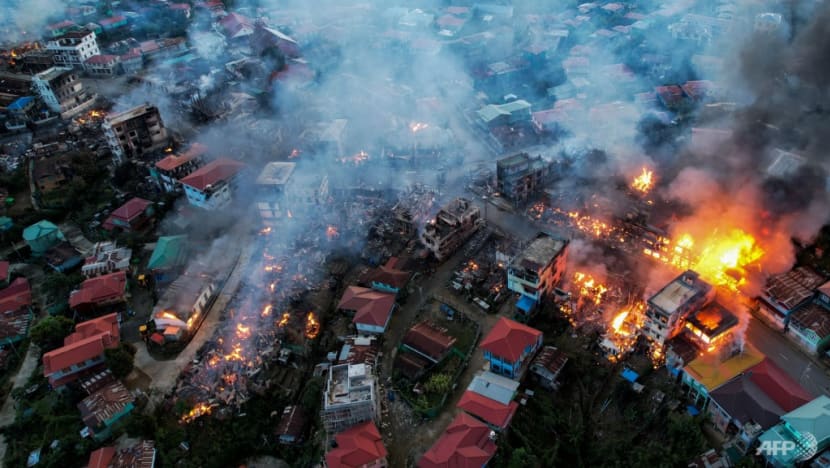Commentary: Another failed attempt to address Myanmar conflict - what’s next?
The failure to solve the Myanmar crisis will have a huge impact on unity and threatens ASEAN’s credibility in the long run, says this research fellow from Indonesian Institute of Advanced International Studies.

This aerial photo taken on October 29, 2021 show smoke and fires from Thantlang, in Chin State, where buildings were destroyed by shelling from junta military troops, according to local media. (Photo: STR / AFP)
JAKARTA: Foreign ministers of the Association of Southeast Nations (ASEAN) countries met earlier this month in Jakarta. This brought together top diplomats from Southeast Asian countries and partner countries outside the region, including the United States, China, Australia, Japan and South Korea.
This year’s chair, Indonesia, wants to focus on how ASEAN can foster collaboration amid regional and global changes. But there is still a long way to go to ASEAN’s mission to create regional stability and security and accelerate economic growth.
This is because ASEAN has not been able to meaningfully address the situation in Myanmar.
The conflict in Myanmar has been going since February 2021, after the military overthrew the democratically elected government of Aung San Suu Kyi.
Since then, a bloody civil war has erupted not only between the junta and the civil opposition but also involving various ethnic groups in the country. It is estimated 12,000 people have been killed and millions of people displaced.
WHY PEACE IN MYANMAR MATTERS
Peace in Myanmar is important to ASEAN for two reasons.
The first is through socio-economic. ASEAN is having difficulties to fully implement equity in economic growth and integration throughout the region through its ASEAN Economic Community ambition. The ASEAN Economic Community ambition envisions ASEAN as a single market and production base, a highly competitive region, with equitable economic development, and fully integrated into the global economy.
The increasingly volatile political situation in Myanmar contributes as one of the factors that hamper the effectiveness of the community and in turn limited its implementation. Not only that, but the current crisis in Myanmar has created a refugee flow of people fleeing the conflict between the junta and the opposition. According to the United Nations, more than 1 million Myanmar people has been internally displaced.
The second reason, arguably more important for ASEAN as an institution, is political. The failure to solve the Myanmar crisis will have a huge impact on unity and threatens ASEAN’s credibility in the long run.
CONTINUOUS FAILURE
Several months after the coup, ASEAN members and the Myanmar junta agreed upon the Five Point Consensus.
This included an immediate end to violence in the country, dialogue among all parties, the appointment of a special envoy, humanitarian assistance by ASEAN and a visit to Myanmar by the envoy to meet with all parties.
This has become the primary reference for ASEAN’s conflict resolution approach in Myanmar.
However, until now, the junta has largely ignored the consensus, leading to a rift within ASEAN over how to further engage the junta.
The four-day high-level conference still resulted in no significant progressing in resolving Myanmar crisis except calling for “inclusive dialogue in Myanmar”. There is no clear time frame and outputs achieved during the conference.
This has raised doubts over the ASEAN’s capability to make visible peace progress in resolving the conflict especially during Indonesia’s time as chair.
Last month, Thailand and Laos held a closed informal meeting with the junta in Thailand to explore “alternative solutions".
The meeting received mixed receptions from other ASEAN member states. Some accused the Thai government of sabotaging Indonesia’s efforts.
Meanwhile, Myanmar’s opposition group released a statement criticising ASEAN’s “continued” failure to resolve the crisis.
ENGAGING COUNTRIES OUTSIDE REGION
ASEAN urgently needs to demonstrate its relevance in contemporary international politics.
Perhaps this is the time for ASEAN to acknowledge it cannot resolve the Myanmar conflict alone and to coordinate more with ASEAN partner countries.
The US and Western allies, for example, have imposed economic sanctions on the regime and restricted the Myanmar government and officials' access to the international financial system.
These sanctions could push the junta towards the negotiation table, which ASEAN, due to its “non-interference policy principle” cannot provide. The principle forbids ASEAN countries from interfering in each other internal affairs. Imposing sanctions would be a breach of this principle.
But ASEAN can link its consensus efforts with the West’s sanctions. It could offer to lift the sanctions if the junta can show progress in negotiations with ASEAN. Of course, this step also needs a mutual consent and commitment by the West. This is just one example on further cooperation between ASEAN and its partner countries to solve the Myanmar conflict.
There is still time for Indonesia to use its time as chair and its strong diplomatic clout to initiate further steps with partner countries to try and improve the situation in Myanmar.
Muhammad Rifqi Daneswara is Research Fellow, Indonesian Institute of Advanced International Studies (INADIS). This commentary first appeared in The Conversation.















